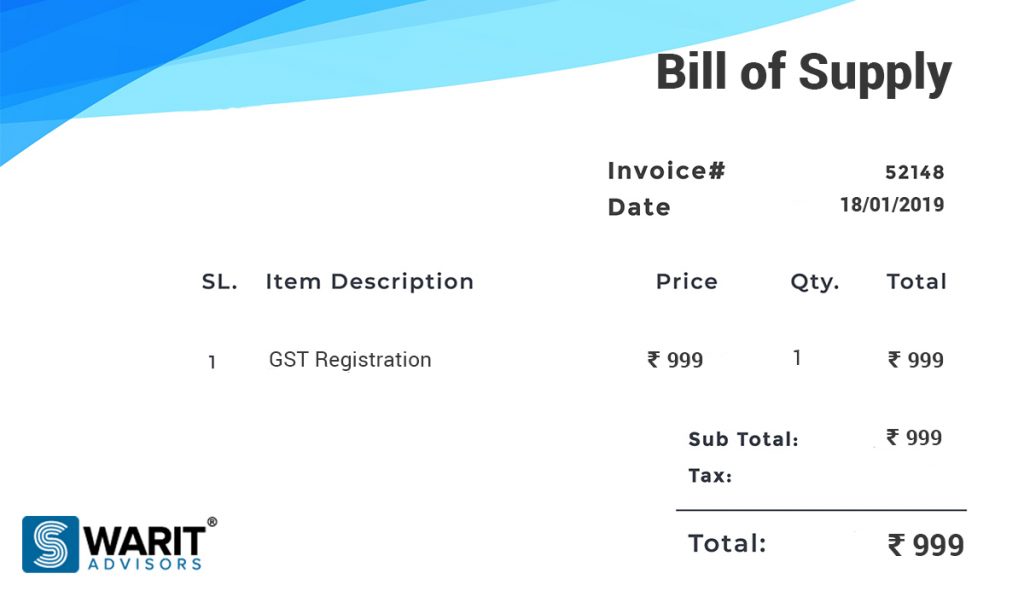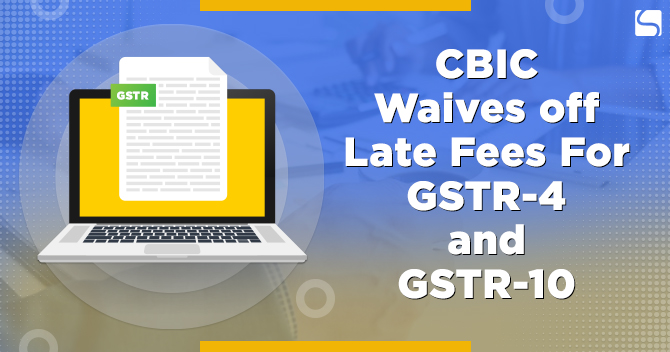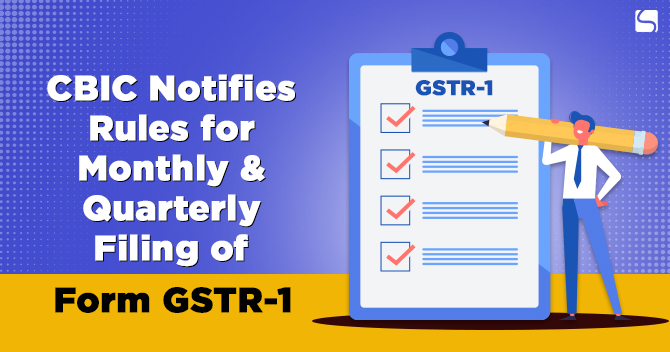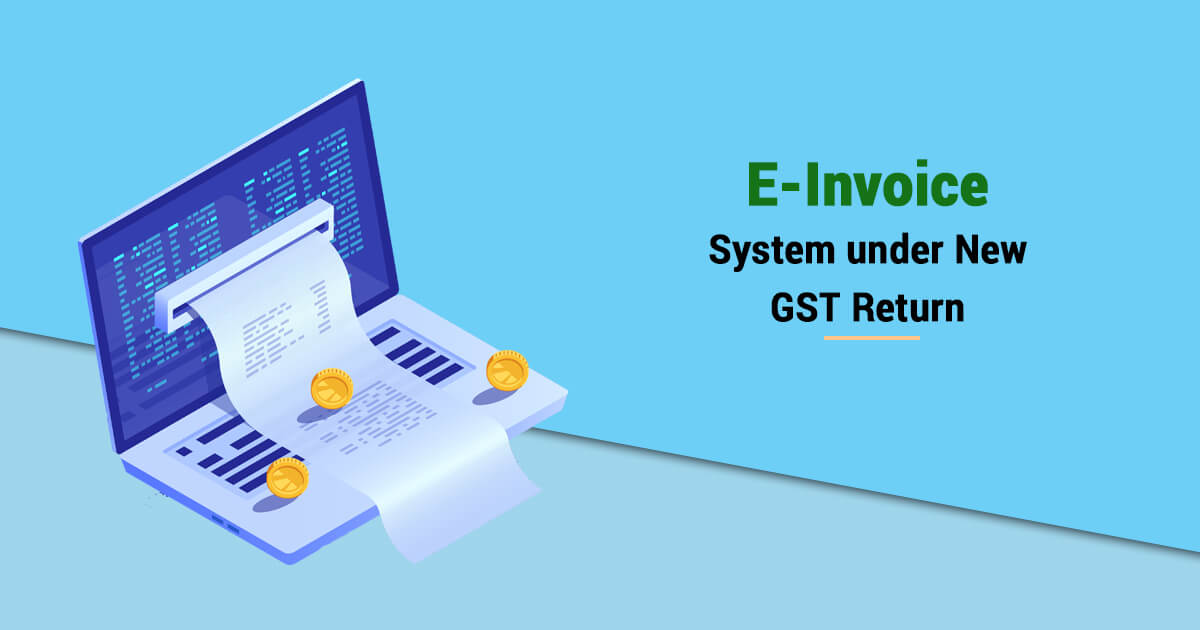What is Bill of Supply under GST ?

Khushboo Priya | Updated: Jan 18, 2019 | Category: GST
A bill of supply is issued by the business registered under GST. Such businesses are required to issue a tax invoice in their day-to-day business. However, there are certain instances wherein the Bill of supply is issued, although GST is not applicable to that transaction. It is also issued in cases where the Tax is not to be recovered from the ultimate customer.
A bill of supply is nothing but a document in the form of Invoice which describes the quantity, product detail, the name of the addressee, GST rate etc.
Often people confuse the bill of supply with tax invoices. And, again both the terms are distinct from each other which we have discussed later. We have covered the following essential topics in this blog-
- Definition
- Difference between Bill of Supply and Tax Invoice
- Similarities between the above two
- Who can issue?
- When is it required to be issued?
- When is it not required to be issued?
Table of Contents
Definition of Bill of Supply
There are some taxpayer and businesses that are exempted from the Goods and Services tax despite being registered under GST. Dealers under this business cannot charge any tax on the invoices issued by them. Such invoices are known as Bill of Supply.
Generally, businesses enrolled with GST issue a tax invoice to the buyer which mentions the GST rate charges on the goods sold and services rendered.
Typically, dealers issue it on a transaction when GST is not applicable or when the customer or receiving person at that point of time isn’t supposed to pay GST for the item he/she has purchased.
Difference between Bill of Supply (BOS) and Tax Invoice
| Bill of Supply | Tax Invoice |
|
It is applicable to all types of exempt sales of goods and services. |
Applicable to all types of Taxable Sales. |
|
Since there isn’t any charge; therefore, there isn’t any provision for displaying any tax separately. |
In the tax invoice, there’s a provision for mentioning CGST, SGST, IGST, and UTGST separately. |
|
There’s no provision for mentioning all the buyer’s detail as in the case of tax invoices. | If you’re an unregistered buyer and invoice value is more than Rs. 50,000, then name, address, state, place of delivery are mandatorily required. |
|
In case of composition dealer, it can be used for only local as they aren’t eligible for interstate sales. However, exempt sales can be made for both central and local sales. | Tax invoices are for both local and central sales. |
Similarities between Bill of Supply (BOS) and Tax Invoice
Despite being different from each other, both are related to each other at some points. Those points are as follows:
- Name, address, and GSTIN (Goods and Services Tax Identification Number) of the supplier;
- Name, address, Unique Identity Number, and GSTIN number of the supplier if he is registered;
- Date on which invoice has been issued;
- Unique Serial Number of every invoice in one or various series but it must be distinct series for every year;
- HSN (Harmonized System of Nomenclature) Code of goods;
- Description of goods;
- The delivery address;
- Total value;
- Both the quantity and quantity code or units;
- Signature of DSC (Digital Signature) of the Authorized Signatory;
- Place of Supply (In the case of Interstate sales).
To be noted:
HSN code is mandatory in the following cases:
- If the turnover is less than Rs. 1.5 crores, then HSN code isn’t required.
- 2-digit HSN code is required when the turnover is between Rs. 1.5 crores to 5 crores.
- 4-digit HSN code is mandatory in the case the turnover exceeds Rs. 5 crores.
Who are the people liable to issue?
There are certain specified people who can issue a BOS. They are-
- Exempted Goods Supplier;
- Composition Dealer; and
- Exporters
Exempted Goods Suppliers
Exempted goods suppliers are the registered dealers who supply exempt goods and services. Such people are required to issue BOS.
For instance, a registered taxpayer providing unprocessed agricultural products is the one who can’t issue a tax invoice but is supposed to issue a BOS.
Composition Dealer
Generally, the composition dealers are those who have opted for composition scheme and whose turnover is below Rs. 75 lakh, in case of the North-Eastern State and less than Rs. 1 crore for other states.
Such dealers have to deposit tax on their receipts themselves, and they aren’t eligible for collecting any tax from their buyers, and therefore, they can only issue BOS to their consumers. The composition dealers cannot charge GST in their invoice; instead, they can pay any such tax out of their own pocket.
Being a composition dealer, you need to mention the words ‘composition taxable person not eligible to collect taxes on supplies’ on the BOS.
Exporters
Same as the above two, exporters too can’t issue a tax invoice or charge GST on their invoice and it’s because exports supplies are zero-rated. Therefore, a taxpayer exporting goods can issue a BOS instead of a tax invoice.
The exporter must mention the following in their BOS:
- Supply meant for Export on the payment of IGST, and
- Supply meant for Export under bond or letter of undertaking without payment of IGST.
When is it required to be issued?
It is required to be issued in the following cases:
a) In the case where the registered person is a supplier of exempted goods; or
For instance, a vegetable vendor would not issue a regular tax invoice on sale but can provide of the bill of supply to his customers.
b) In the case where the registered person chooses the composition scheme.
When is it not required to be issued?
Following are the cases when a bill of supply is not supposed to be issued:
a) If the value of supplied goods or services is less than Rs. 200;
b) If the recipient is not registered under the GST Act; and
c) If the recipient does not intend to avail or receive any such copy or document or receipt.
Final Takeaway
From the above discussion we can safely conclude that irrespective of GST registration, you can only issue Bill of Supply if you are a composition dealer or exporter or exempted goods supplier. You can’t issue a tax invoice if you fall under any of the formerly described categories.
How can Swarit Advisors help you with this?
Since the format isn’t so easy, we at Swarit Advisors will help you to make an accurate Bill of Supply so that you don’t find any trouble while dealing with consumers. We shall also assist you in solving legal queries related to Bill of supply under GST. To know more Contact Swarit Advisors.
Also, Read: Goods Transport Agency (GTA) under GST.














